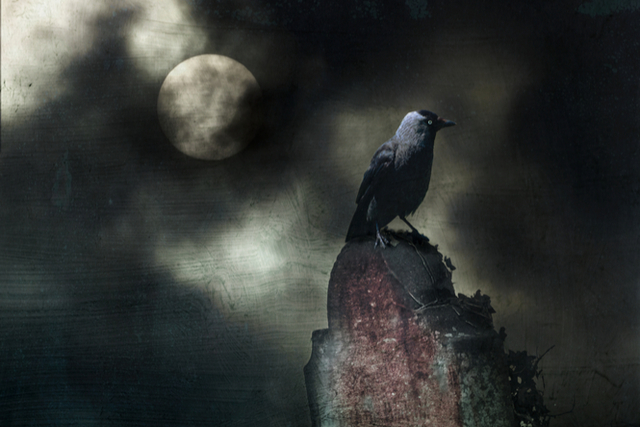
The master of Gothic horror stories, Edgar Allan Poe could set the tone of anything with a few chosen words. Consider the start of The Raven:
Once upon a midnight dreary, while I pondered, weak and weary,
Over many a quaint and curious volume of forgotten lore,
While I nodded, nearly napping, suddenly there came a tapping,
As of some one gently rapping, rapping at my chamber door.
"'Tis some visitor, " I muttered, "tapping at my chamber door—
Only this, and nothing more."
And consider the opening sentence of The Fall of the House of Usher:
During the whole of a dull, dark, and soundless day in the autumn of the year, when the clouds hung oppressively low in the heavens, I had been passing alone on horseback, through a singularly dreary tract of country; and at length found myself, as the shades of the evening drew on, within view of the melancholy House of Usher.
What can you learn from Poe?
There are two things that jump out from the above examples and many of Poe's other works. First, Poe writes as a first-person narrator, putting you in the driver's seat. You're never quite sure if the narrator is sane or not, like in The Tell-Tale Heart. Not knowing if you can trust the narrator adds to the suspense and horror as the story progresses and the narrator hears the "low, dull, quick" sound—the beating of the old man's dead heart. Can anyone else hear it? We're not sure.
And he uses all five senses to bring a vivid picture to your mind. In A Tell-Tale Heart, Poe talks about the old man's evil eye with a film over it. That's enough to give me the heeby-jeebies. But when Poe goes into detail about how the narrator slowly sticks his head inside the old man's room in the middle of the night for 8 days in a row, I hyperventilate.
Who doesn't have nightmares about someone stealing in their bedroom and standing over them in the dead of night? And Poe caters to those fears with singularly imaginative details that creep people out. His heavy use of sights and sounds in A Tell-Tale Heart sets up a mysterious mood that turns to heinous when the narrator dismembers the old man's corpse.
Examples
Let's look at how word choice can create three different moods using the same setting: a cabin in the woods.
Example 1
Set back from the logging road, the cabin blended in with the dark, dank woods. I could make out a sagging front porch and windows streaked with grime. A chill swept over my skin. The birds, insects, and woodland creatures were silent, and not a breath of air stirred the leaves in the trees.
A little creepy, yes? Who knows what kind of human or animal lives inside that cabin.
Example 2
Set back from the logging road, the cabin nestled in the surrounding trees. Birds and insects made a lively chatter all around, and a warm breeze rustled the leaves. The front porch held wooden rocking chairs with thick, padded cushioned seats. The cabin's windows were bright and clean with cheery curtains swept back by ribbons.
I could hang out there; how about you?
Example 3
Set back from the logging road, the cabin foundered in the surrounding woods, sinking into the gloom. A weary front porch held remnants of an era long gone, with broken toys and furniture in dire need of reupholstering. The cabin's windows were shuttered and stark, and a tired breeze sighed in the tree tops.
Are you depressed yet?
In each of the above examples, word choice made all the difference in mood. Like a master painter, choose your words carefully to paint a vivid picture. You can do the same exercise as the examples above with your narrator's mood. Choosing specific words can convey if your narrator is a dark, brooding soul or a chipper, glass-is-half-full optimist.
Final thoughts
Be mindful of the images, sounds, scents, textures, and even tastes of what's around your characters to help set the mood. Write with your handy Thesaurus close by to create the exact mood you want your readers to feel.
Let us know in the comments below how you best like to paint the mood of your story. And tell us which of master Poe's stories or poems creeped you out the most the first time you read it.

